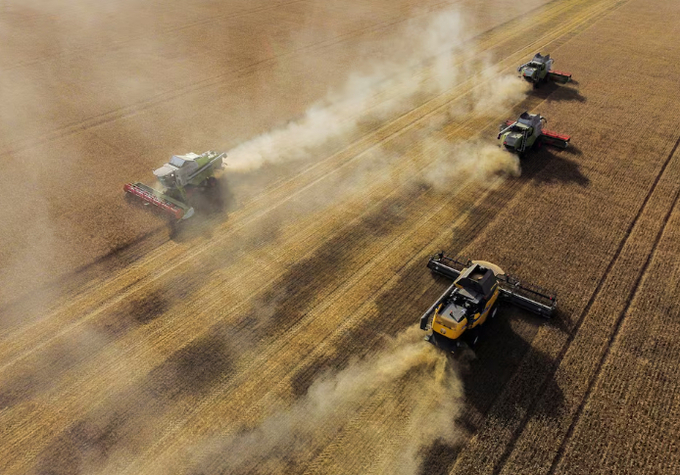June 16, 2025 | 03:21 GMT +7
June 16, 2025 | 03:21 GMT +7
Hotline: 0913.378.918
June 16, 2025 | 03:21 GMT +7
Hotline: 0913.378.918

Combines harvest wheat in a field of a local agricultural enterprise in the Cherlaksky district of the Omsk region, Russia, September 8, 2023.
Traders said Russian and Belarusian shipments to the bloc were low, certainly relative to those from Ukraine, and that the imposition of tariffs was largely symbolic.
Russian research company SovEcon said it would have little impact on grain trade and prices, given only 2% of Russian shipments went to Europe, with the exception of sunflower meal, of which the European Union took a third of Russian exports.
The Financial Times reported that the European Commission would propose a duty of 95 euros ($103.26) per metric ton on cereals from Russia and Belarus, with tariffs of 50% on oil seeds and derived products.
One EU official said the figures were "about right" though were still to be finalised. Another said the measure was likely to be in the form of a tariff because trade measures require only majority EU support, unlike sanctions which need unanimity.
The tariffs would apply to grains destined for use in the 27-member EU and would not apply to the transit of grains through the bloc to other countries, the sources said.
The move comes as farmers across the EU call for changes to restrictions placed on them by its Green Deal plan to tackle climate change, and for the re-imposition of customs duties on imports of agricultural products from Ukraine that were waived after Russia's invasion in 2022.
Farmers from neighboring Poland, Hungary and Slovakia, all of which are members of the EU, say the move undercut their prices. Ukraine is not part of the bloc.
Like much of Europe, Poland has been gripped by protests in recent weeks as farmers demonstrate against EU environmental regulations.
Polish Prime Minister Donald Tusk has called for an EU ban on imports of Russian and Belarusian agricultural products, as did many EU lawmakers in a European Parliament debate last week.
Total EU imports of grain and oilseed in 2023/2024 from Russia stood at 1.8 million tons by the end of February, European Commission data showed. That compared with 19.1 million tons from Ukraine.
Kyiv has called for a complete EU ban on Russian food imports, although a Ukraine source said the volume of Russian grains was not really large enough to influence European prices.
"It looks highly symbolic with only minor volumes involved from Russia which could be pretty easily replaced. I cannot see any big waves from this," a German trader said.
A Russian trader said tariffs could nevertheless be painful for sunflower producers in Russia as Europe is the main destination for exports of sunflower meal. ($1 = 0.9200 euros)
(Reuters)

(VAN) Extensive licensing requirements raise concerns about intellectual property theft.

(VAN) As of Friday, a salmonella outbreak linked to a California egg producer had sickened at least 79 people. Of the infected people, 21 hospitalizations were reported, U.S. health officials said.

(VAN) With the war ongoing, many Ukrainian farmers and rural farming families face limited access to their land due to mines and lack the financial resources to purchase needed agricultural inputs.

(VAN) Vikas Rambal has quietly built a $5 billion business empire in manufacturing, property and solar, and catapulted onto the Rich List.

(VAN) Available cropland now at less than five percent, according to latest geospatial assessment from FAO and UNOSAT.

(VAN) Alt Carbon has raised $12 million in a seed round as it plans to scale its carbon dioxide removal work in the South Asian nation.

(VAN) Attempts to bring down the price of the Japanese staple have had little effect amid a cost-of-living crisis.